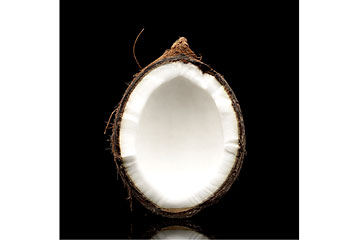
Coconut
Under a metal roof in dandagamuwa, in western Sri Lanka, a line of seated men and women swing their small axes in sharp, neat strokes. Chips of brown coconut husk fly into the muggy October air, thick with the ripe smell of fermenting fruit. In seven or eight swift flicks of the wrist, the hatcheters render each coconut into a smooth white globe that they pass on to be shredded, dried and pressed into oil. At the end of the line, pallets of neatly labeled mason jars wait, ready to be shipped.
The destination: a Los Angeles warehouse some 9,300 miles away--and eventually, the shelves of natural-food stores across the U.S. The coconut is becoming America's latest trendy exotic edible, following the path of the pomegranate and the aa berry. The hottest part of the market is coconut water, the clear, slightly sweet liquid inside the fruit: sales of coconut-water drinks in the U.S. and Europe have doubled to more than $265 million in 2011 and are expected to double again in the U.S. this year, according to New Nutrition Business, a consulting group in London. "Coconut water is the fastest growing beverage category in the world," says Julian Mellentin, director of New Nutrition Business. "It's growing even faster than energy drinks."
Other parts of the coconut are in demand too. Coconut oil, once demonized for its high saturated-fat content, has been rehabilitated by research extolling its health benefits and by the popularity of vegan baking. The organic, fair-trade virgin coconut oil produced in Dandagamuwa for the Dr. Bronner's brand can be used as a substitute for butter.
It has all the makings of a health-food success story, but growers and processors are worried that the coconut craze may not be sustainable. The supply chain is efficient globally but not locally. Coconuts are grown mainly by small farmers from Brazil to Kenya to Indonesia, who often sell their output to middlemen. In many places, that means the sudden popularity of coconuts is not yet translating into higher prices for farmers. There is plenty of fruit now, but as producers work through existing supply, they worry that future supplies may be unreliable. For years, many farmers in Asia have been selling their crops without replanting because the prices they get are too low to justify increasing production. Fair-trade programs have not yet reached as far into the coconut trade as they have with other commodities, like coffee. For an industry in a growth spurt, that's trouble.
Down on the Farm
Unlike most supermarket produce, coconuts are typically grown by smallholders, farmers who own or rent less than a dozen acres of land. They frequently sell their fruit to middlemen, who in turn sell it to factories that produce dried coconut meat, coconut husk, coconut oil and--more and more--coconut water. In their native areas, coconut trees grow abundantly without much tending, and farmers often don't earn enough to afford chemical fertilizers. That's a boon for companies selling the "natural" appeal of coconuts, since prices can be low and many coconut estates are organic by default.
